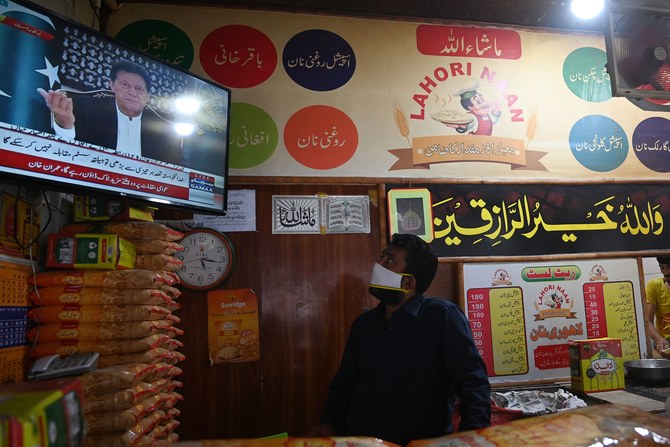ISLAMABAD/KARACHI: Prime Minister Imran Khan said on Monday meeting the demand of a recently banned religious political party, the Tehreek-e-Labbaik Pakistan (TLP), to break diplomatic ties with France would hit Pakistani exports to the European Union and fuel poverty, unemployment and inflation in the country.
Violent protests by the rightwing group have rocked the country since last Monday when TLP chief Saad Rizvi was arrested in Lahore for threatening the government with rallies if it did not expel the French envoy to Islamabad over cartoons of the Prophet Muhammad (peace be upon him) published in France last year.
The protests have paralyzed major cities and highways all week, leading to the killing of six policemen with over 800 injured, according to the government. Photographs of the police, with their heads, legs and arms heavily bandaged, have been posted on social media by their captors through the week.
On Sunday, TLP said three of its members were killed during clashes outside the TLP’s headquarters in the eastern city of Lahore. The group also took a number of police officers and paramilitary troops hostage, releasing 11 policemen in the early hours of Monday after negotiations with the government.
The riots have also prompted the French embassy last week to recommend all its nationals temporarily leave the country.
TLP is calling on the government to honor what it says was a commitment made in February to the party to expel the French envoy before April 20 over the publication of blasphemous cartoons in France. PM Khan says his government had only committed to debating the matter in Parliament.
"The biggest effect [of breaking ties with France] will be that after great difficulty our economy is rising, the large-scale industry is getting up after a long time, people are getting jobs, wealth is increasing in our country, our exports are rising and after a long time, our rupee is strengthening,” Khan said in a televised address to the nation, adding that breaking ties with France was tantamount to severing relations with the entire European Union.
“Half of our textile exports go to the EU and that will be stopped, resulting in unemployment, devaluation of the rupee, increase in inflation and poverty,” Khan said. “We will be at loss but this won’t make any difference to France.”
The prime minister said head of states of all Muslim countries should collectively take up the issue of blasphemy at the United Nations and EU: “We should tell the western countries that blasphemy to our Prophet [PBUH] in the name of freedom of speech hurts us. And if they don’t stop it, we can then collectively do the trade boycott.”
Khan said this was the only way to “achieve the objective” of creating an environment in which no one would dare to disrespect the Prophet (pbuh), and he himself would lead the global campaign to ensure this.
The premier’s address came as the government went into a third round of negotiations with the TLP.
“We believe in negotiations and it’s our policy,” Federal Minister for Religious Affairs Pir Noorul Haq Qadri said in a policy statement in the National Assembly on Monday. “We held negotiations [with the protesters] yesterday, in the morning and the third session will be held tonight after the Tarawih prayer.”
The minister assured parliament the deadlock with protesters would be resolved through negotiations: “No political, democratic and elected government can afford such things and whatever happened in the past few days is regrettable to everyone.”
On Sunday evening, Information Minister Fawad Hussain Chaudhry had said the government was forced to launch an armed operation against protesters after they kidnapped law enforcement officials.
“The government believes in negotiations but can’t be blackmailed,” he said. “The operation was started after police and Rangers personnel were kidnapped ... [Prime Minister] Imran Khan has the strongest affection with the Prophet (pbuh) and he has talked about this at every [national and global] forum.”
Earlier on Sunday, a police spokesperson, Arif Rana, said the operation against the TLP had been halted as the attackers were armed with petrol bombs and a tanker with 50,000 liters of petrol.
By Sunday evening, he said, the situation was “at a standstill” with protesters sitting on roadsides with sticks and petrol bombs in their hands and law enforcement standing guard.
Last week, the interior ministry said it was moving to have the TLP party banned for attacking police and paramilitary troops and disrupting public life during its protests. The interior ministry’s decision has been approved by the federal cabinet but needs to be ratified by the Supreme Court for the TLP to be officially dissolved.
In October 2020, protests broke out in several Muslim countries, including Pakistan, over France’s response to a deadly attack on a teacher who showed cartoons mocking the Prophet Muhammad (pbuh) to his pupils during a civics lesson. French President Emmanuel Macron has defended the caricatures as freedom of expression.
During last year's protests in Pakistan, the government negotiated with the TLP and met a number of its demands, including that it would debate expelling the French ambassador in parliament.
A deadline to make that parliamentary move expires on April 20.
Saad Rizvi became the leader of the Tehreek-e-Labiak Pakistan party last November after the sudden death of his father, the firebrand cleric Khadim Hussein Rizvi.
Rizvi’s party gained prominence in Pakistan’s 2018 federal elections, campaigning to defend the country’s blasphemy laws, which call for the death penalty for anyone who insults Islam. The party also has a history of staging protests and sit-ins to pressure the government to accept its demands.
In November 2017, Rizvi’s followers staged a 21-day protest and sit-in after a reference to the sanctity of the Prophet Muhammad (pbuh) was removed from the text of a government form.












